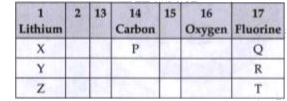_____ reaction causes more reactive metal to replace lesser reactive metal from the latters compound (Decomposition/Displacement)
To solve the question, we need to identify the type of reaction that allows a more reactive metal to replace a lesser reactive metal from its compound. The options given are "Decomposition" and "Displacement."
1. Understanding the Terms:
- Decomposition Reaction: This type of reaction involves a single reactant breaking down into simpler products. For example, when potassium chlorate (KClO3) is heated, it decomposes into potassium chloride (KCl) and oxygen (O2).
- Displacement Reaction: In this reaction, a more reactive metal displaces a less reactive metal from its compound. For example, when zinc (Zn) reacts with sulfuric acid (H2SO4), zinc displaces hydrogen (H) because it is more reactive.
2. Analyzing the Question:
- The question specifically asks for a reaction where a more reactive metal replaces a less reactive metal from its compound. This indicates that we are looking for a reaction where one metal takes the place of another in a compound.
3. Identifying the Correct Reaction:
- Since the definition of a displacement reaction fits the scenario described in the question (more reactive metal replacing a less reactive metal), we can conclude that this is the correct type of reaction.
- In contrast, a decomposition reaction does not involve the replacement of one metal by another but rather the breakdown of a single compound into simpler substances.
4. Conclusion:
- Therefore, the answer to the question is "Displacement."
Final Answer:
Displacement reaction causes more reactive metal to replace lesser reactive metal from the latter's compound.
---
- Decomposition Reaction: This type of reaction involves a single reactant breaking down into simpler products. For example, when potassium chlorate (KClO3) is heated, it decomposes into potassium chloride (KCl) and oxygen (O2).
- Displacement Reaction: In this reaction, a more reactive metal displaces a less reactive metal from its compound. For example, when zinc (Zn) reacts with sulfuric acid (H2SO4), zinc displaces hydrogen (H) because it is more reactive.
- The question specifically asks for a reaction where a more reactive metal replaces a less reactive metal from its compound. This indicates that we are looking for a reaction where one metal takes the place of another in a compound.
- Since the definition of a displacement reaction fits the scenario described in the question (more reactive metal replacing a less reactive metal), we can conclude that this is the correct type of reaction.
- In contrast, a decomposition reaction does not involve the replacement of one metal by another but rather the breakdown of a single compound into simpler substances.
- Therefore, the answer to the question is "Displacement."
Displacement reaction causes more reactive metal to replace lesser reactive metal from the latter's compound.
Topper's Solved these Questions
- METALS AND NON METALSBOOK - S CHAND IIT JEE FOUNDATIONCHAPTER - METALS AND NON METALSEXERCISE - QUESTION BANK-15
141 Videos
- HYDROGENBOOK - S CHAND IIT JEE FOUNDATIONCHAPTER - HYDROGENEXERCISE - SELF ASSESSMENT SHEET
28 Videos
- SYNTHETIC FIBRES AND PLASTICSBOOK - S CHAND IIT JEE FOUNDATIONCHAPTER - SYNTHETIC FIBRES AND PLASTICSEXERCISE - Self Assessment Sheet - 14
29 Videos
Similar Questions
Knowledge Check
Which is most reactive metal
AFeBPtCNiDCoIdentify the most reactive metal.
AIronBGoldCZincDPotassiumCertain metals have the capacity to displace some metals from their salt solutions. These reactions are known as metal displacement reactions. A metal placed higher in activity series can displace the metal occupying lower position from aqueous solution of its salt or a more reactive metal can displace less reactive metal from its salt solution.
Q. Displacement reactions are shown byAmetals onlyBnon-metals onlyCboth metals and non-metalsDall the elements.

